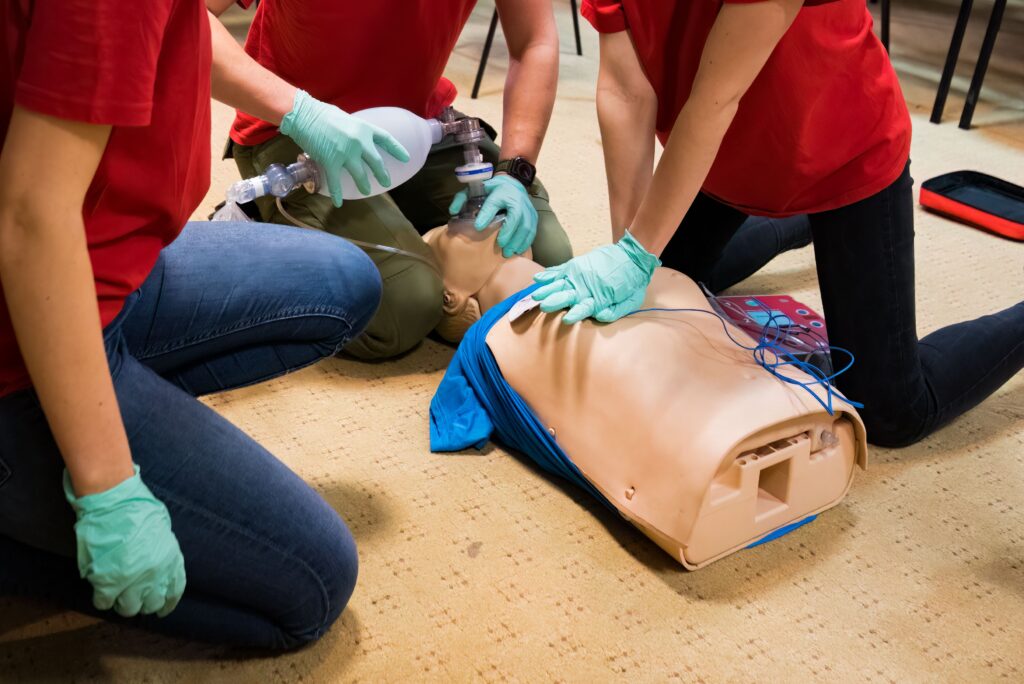
Emergencies don’t wait—and neither should your response. When a patient experiences sudden cardiac arrest, stroke, or a severe arrhythmia, every minute is critical. This is where Advanced Cardiovascular Life Support (ACLS) training becomes a true life-saver. It’s not just another certification to hang on the wall; it’s an essential tool in a healthcare provider’s arsenal.
At Nationwide Health CPR, we offer comprehensive ACLS courses designed to help you stay calm under pressure, make evidence-based decisions, and ultimately, save lives. With hands-on training, real-world scenarios, and instruction from seasoned professionals, you’ll leave our program with more than a certification—you’ll gain confidence.

ACLS is an advanced set of clinical algorithms and procedures developed by the American Heart Association (AHA). It goes beyond Basic Life Support (BLS) by teaching providers how to manage complex cardiovascular and respiratory emergencies using advanced interventions.
The core components of ACLS include:
These skills are crucial for a wide range of healthcare professionals—from emergency room nurses and paramedics to physicians and respiratory therapists.
Let’s paint a picture: a patient collapses due to cardiac arrest. A nurse quickly starts CPR. An ACLS-trained team arrives, identifies a shockable rhythm, administers epinephrine, and delivers a shock using a defibrillator. Within minutes, the patient has a heartbeat again.
That outcome isn’t magic—it’s ACLS in action.
When performed correctly, ACLS significantly increases the odds of:
ACLS training sharpens your ability to assess, react, and lead in high-stakes situations. It turns chaotic code blues into coordinated efforts where every second is optimized.
Inside the ACLS Course at Nationwide Health CPR
At Nationwide Health CPR, we believe in quality training that mirrors real-life situations. Our ACLS certification course is instructor-led and follows the latest AHA 2020 guidelines. Here’s what you can expect:
Learn to properly insert and manage airway devices like endotracheal tubes and supraglottic airways, essential during respiratory compromise.
Interpret ECG rhythms quickly and accurately to determine the right interventions—be it defibrillation, pacing, or medication.
Understand when and how to use life-saving drugs like:
Practice with your team in simulated emergency scenarios that mirror the high-stress environments of hospitals and ambulances.
Understand the next steps after ROSC: maintaining oxygenation, managing blood pressure, and transferring the patient to critical care.

Located in Broward County, Florida, Nationwide Health CPR is a trusted AHA-authorized Training Center serving a broad range of medical professionals. Whether you’re a new nurse looking to specialize or a seasoned paramedic needing renewal, our ACLS training adapts to your experience level and schedule.
We offer:
Our instructors include registered nurses, paramedics, and doctors, all with years of experience in emergency and critical care.

If you work in a healthcare setting where emergencies can happen, ACLS certification should be on your radar. This includes:
Don’t wait until your current certification expires. Stay prepared. Here’s an example of an upcoming ACLS renewal course:
🗓️ ACLS Update Course
📍 Nationwide Health CPR – Coral Springs, FL
🕗 April 17, 2025 | 8:00 AM – 5:00 PM
🧠 Focused on high-performance CPR, updated guidelines, and real-life team simulations.
Visit the official course schedule here to register today.
Is ACLS the same as BLS?
No. ACLS is more advanced, involving ECG interpretation, drug administration, and team-based resuscitation, while BLS focuses on chest compressions and AED use.
How long is ACLS certification valid?
Two years, after which you’ll need to renew to stay current with guidelines.
Do I need to be a nurse or doctor to take ACLS?
No. Paramedics, EMTs, respiratory therapists, and other licensed providers can—and should—get certified.
Are blended or online options available?
Yes! Nationwide Health CPR offers blended learning options that combine online modules with an in-person skills session.
What’s the cost of ACLS training?
Prices vary depending on initial vs. renewal and any bundled courses. Group rates are also available.
Additional Resources
For the latest ACLS guidelines and evidence-based practices, refer to the American Heart Association’s official ACLS page.
ACLS isn’t just a requirement—it’s a responsibility. Being prepared means being trained, updated, and confident enough to lead when it matters most.
Nationwide Health CPR gives you that edge. With expert instructors, flexible options, and real-world simulations, our ACLS training ensures you’re not just certified—you’re ready.📞 Questions? Need to schedule a group class? Contact us here and let’s get you trained to make a difference.

Nationwide Health
1000 West McNab Road, 108
Pompano Beach, Florida 33069
(954)532-2594
866-456-1274
© 2022 Nationwide Health, LLC | All Rights Reserved | Privacy Policy | Website by Think Big Websites